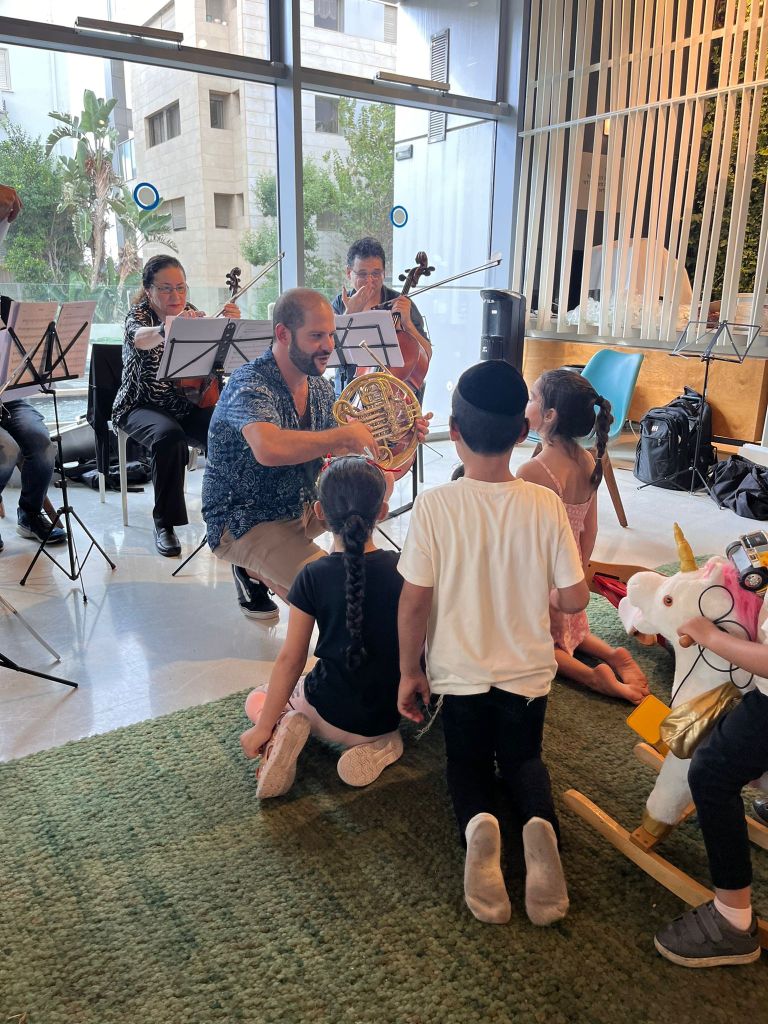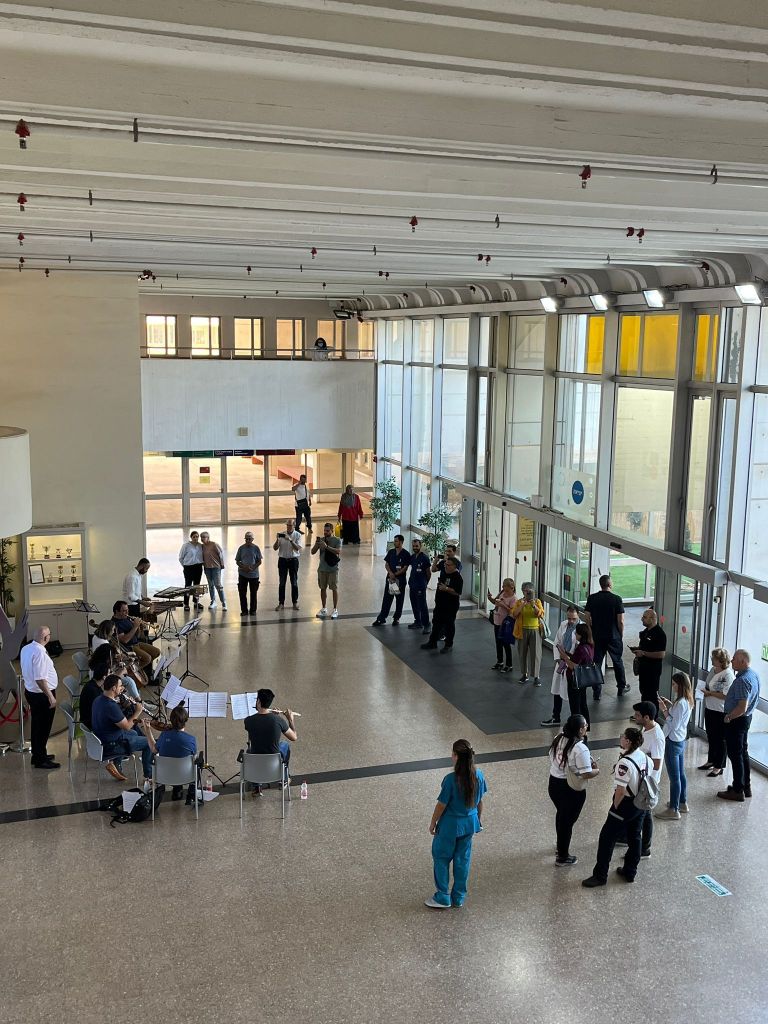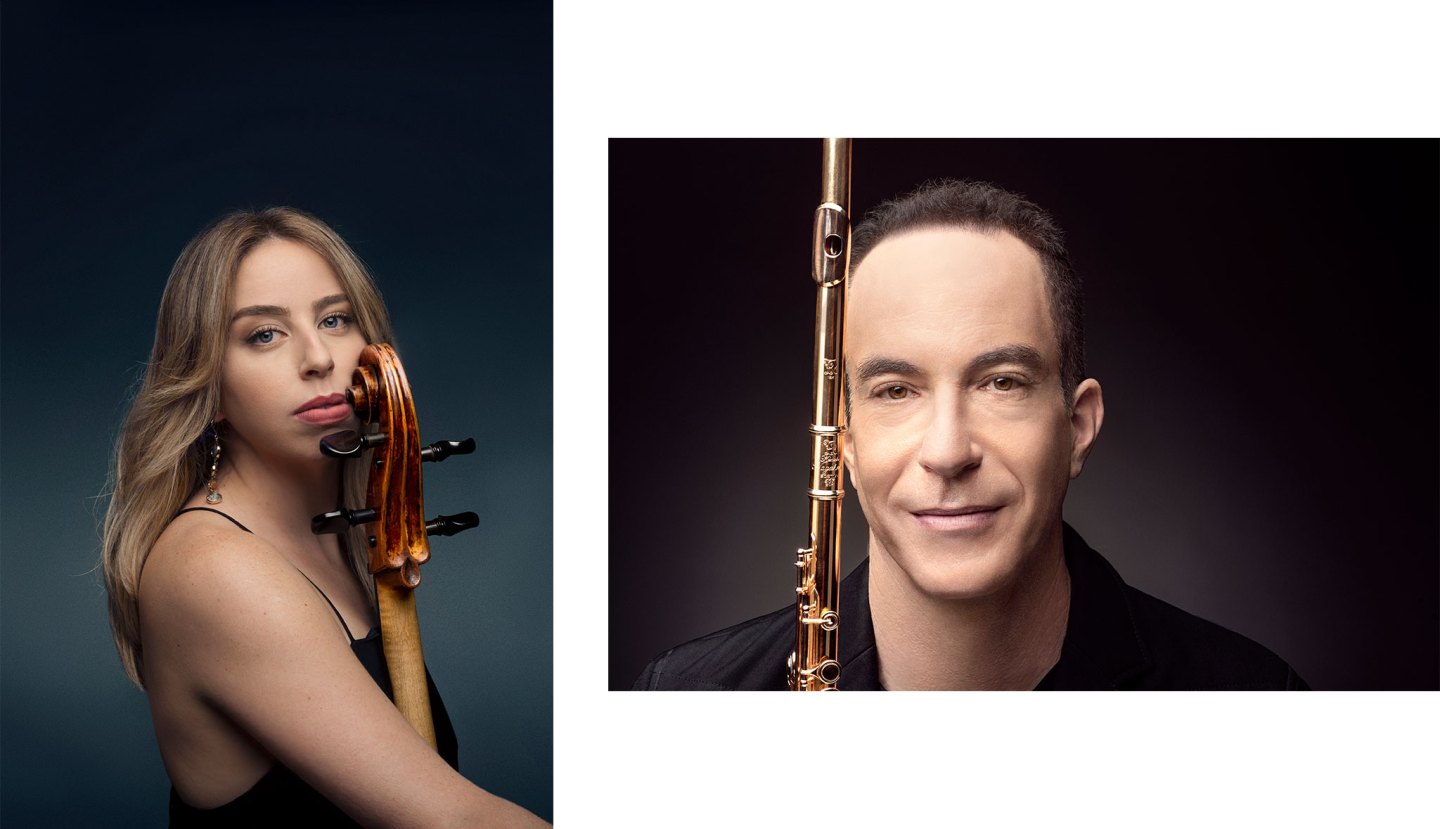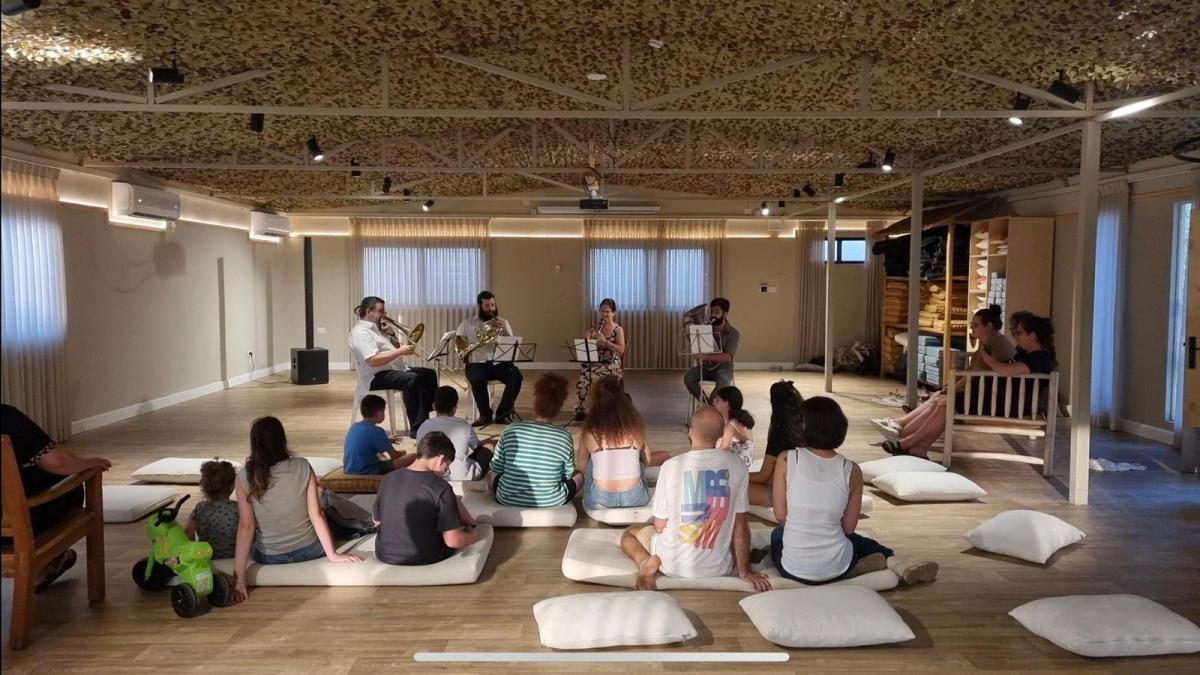“Since the war started, this is the first time I’m talking about my experience and about how I feel,” says Lia Perlov, the principal cellist of the Israel Philharmonic Orchestra (IPO), at the beginning of our Zoom call on Tuesday. “I don’t even talk about this with my partner or my parents. Because it’s too hard to process. It’s very difficult to put it into a sentence that makes sense, because the shock is so big.” This interview, with Perlov and Boaz Meirovitch, a flutist in the IPO who also works in the orchestra’s management, was originally planned for Monday, but air raid sirens in Tel Aviv made that impossible. Perlov and Meirovitch had to take shelter as best they could. “I live on the sixth floor,” Meirovitch tells me, “so getting to the bunker takes too long. When you hear the sirens, you only have about a minute and a half before the rockets come. So my partner and I just go into the stairwell and hope our house isn’t hit.”
VAN: What is the situation in Tel Aviv like right now?
Perlov: Normally the city is full of people, happy and loud, but these days are quiet. It goes in waves, depending on the situation down there [in the south of Israel] and on the sirens. Whenever news comes out or there is a siren, the next hour or two are quiet. People stay home. Mornings are better. People do go out: they want to have some sort of a routine in this madness. Nights are pretty scary. By 7 p.m., the city is really empty.
Meirovitch: The slogan of Tel Aviv is “nonstop city.” But now it’s extremely quiet. Except for the supermarkets, all the shops are closed. You hardly see people, the atmosphere is very gloomy. Normally you hear music from coffee places or restaurants, now there is nothing. The city is in complete shock.
What was your experience of the days since Hamas’s terrorist attack?
Perlov: I didn’t experience trauma first hand, but I would say I have secondary trauma, like the majority of Israeli civilians. I hadn’t been to Israel for two months [before the attack], we had a wonderful IPO tour around Europe, I had a bunch of different projects. I came back Friday night and on Saturday, at 6 a.m., I heard something that sounded to me like Iron Dome, but I wasn’t sure. I woke up and said to my partner: “Something is happening.” I went back to sleep and an hour later the siren began. You get up, see all the neighbors, everyone confused. Then you open the news and see what’s happening. From that point on it is really hard to process what you see.
There are two different realities: The reality of the news you see on television, and then Telegram and social media. You see things you are not supposed to see, and you’re worried about people who might be there or people who know people who are there—your cousin’s best friend or your uncle’s colleague.… Almost everyone knows a person who was there at this moment.
From that point on you’re in absolute shock. You’re really scared, you don’t leave home because you don’t know how many terrorists have entered the country, where they are. You just wait until something good will happen eventually, but it only gets worse and worse. Words cannot describe this. I talked to people on the phone: “I know him and he is missing.” “I know her and she is dead.” The country is really small. Everybody knows everybody. So it’s traumatic for everybody.
Meirovitch: I remember this so vividly. I woke up at 6:30 a.m., not from the sirens, but from explosions I heard from far away. I didn’t understand: Why are there explosions? I went to see the news and in the beginning no one knew what was going on and there was no news, nothing was on. It was Saturday morning TV; children’s shows. And then the sirens started.
Then it was like Lia said: It’s horrible, you don’t know what’s going on, and then you see these videos on social media. It’s unbelievable that these terrorists put all the videos online. You see how they execute people who are a one hour drive away from your house, how these terrorists kill men, women, and children. There is nothing in the world that can prepare you for that. My boyfriend and I were shocked, I was crying for hours. Then I stopped watching.
Perlov: By like 9 or 10 a.m., I knew we were talking about at least 400 or 500 people who were killed—just by the videos that were online. But the news [from that morning] said: “Maybe ten or 20 people.”
Meirovitch: All this murdering and kidnapping happened in two or three hours. How can people do that? How can the country move on after this? But I have to be a bit optimistic, because after this happened, hundreds and thousands of people are volunteering, opening their houses. Airbnb apartments are given for free to people who escaped from this horror. Almost all of the hotels in Israel are hosting people for free.
Perlov: From the second day of the war, the solidarity that people were showing all over the country was touching. It’s very productive, it’s really about, “Let’s get together, let’s bring food to people who need it, let’s make sure people have clothes, let’s make sure people who have kids get babysitting, let’s make sure that in the evenings parents can go for a walk…” And this is just amazing to see. Because as bad as Telegram and social media can be with the things they have shown us—things that we don’t have the capacity to digest as human beings—it is also amazing how we can use it to do something good.

You also found a way of helping through music. How did that come about?
Perlov: It started with people asking for the most essential things for other people: food, soap… Slowly it grew into offering cultural stuff for the kids so they can have some sort of distraction. On Wednesday [after the attacks] I sat home and I thought: I can’t sit here, do barely nothing, have an anxiety level that I never knew I could have, and hope for the best. I have to turn it into something productive. So I asked two or three of my friends if they wanted to play with me for the kids in these hostels.
We were looking for [musical] arrangements [to play]. Classical music is not the easiest thing at this time, that is what we noticed. At least for the first moments right after the big trauma. For example, a second movement of a Beethoven quartet can be too hard. These people need time to understand what they have been through. The only thing we feel that we can play at the moment are arrangements of happy Israeli songs. So I searched for new arrangements of these songs, wrote a Facebook post and asked people to donate arrangements. And within two hours I had over 50 new arrangements that were written especially for just now. We played these in a few hostels and in a hospital.
Meirovitch: Last Friday I performed at a tech company’s [building], and they evacuated their huge building, like four floors, brought hundreds of mattresses, and now there are hundreds of families there. Of course not everyone came [to the concert], because there are people you can’t talk to, because of what they have been through… they don’t talk. But you see how people really want to help, how our orchestra is helping. We really try to do the best we can in this horrible situation.
What kind of reactions to the music have you gotten from these people?
Perlov: The reactions are different. Yesterday when we started playing, a woman was standing on the side and started crying. It was really difficult for her. Another woman was singing with her kids the whole time. One man came to me and said that since Saturday he couldn’t listen to music, he didn’t have the ability to feel all these emotions. But after we played, he wanted to listen to music again.
I think what we’re doing is the best thing we can do. Right now it’s about bringing people comfort and making them feel that they are not alone and helping them to cope with trauma that will remain forever. And it’s about making it a tiny, tiny, tiny bit easier. That’s the only thing we can do right now.
In the same Facebook post, I said that if any musician friend of mine wants to voluntarily play for rescued people from the south they should write to me. I started with a group of three musicians, all from the IPO. Now we are a group of 40 musicians, mostly from the IPO. It’s beautiful: People want to help, to bring comfort, to comfort themselves by doing something, to be a part of this war that we are in.
How do you understand your role as a musician in these times of war?
Perlov: A big part of our role as musicians is to bring comfort. I think [in general] our role is to deliberate things that make us question stuff. But I wouldn’t say that this is the time to ask questions with music. It is a time to make people feel more safe.
What do you mean by asking questions through music?
Perlov: I do think that music is an excellent and beautiful form in which to ask questions, even political questions. But there are times when I think questions should not be asked or discussed. There should only be comfort and warmth and the feeling of togetherness: that we are in this together, no matter where we come from, no matter what our background is, if we are Jews, Muslims, or atheists… It doesn’t matter. Right now is the time to think of each other and be with each other. And I believe music helps us feel this way.
Lia, you studied in Lübeck. Have you been following the discussion in Germany about the war?
Perlov: Yeah. My sister lives in Germany. I lived in Germany for nine and a half years. I would say it’s my second home. I have lots of German friends. I do follow everything. It’s been really difficult to just answer messages from my friends. I was so touched by the amount of people who wrote to me, to ask how I am. So I wrote briefly: “I’m safe. Thank you.” I couldn’t bring myself to tell them what was really going on. So many little things have changed that I can’t describe it. Noises have become so… A motorcycle goes “wrrrrrrrm” and you just think it’s a siren. You hear something like [puts a glass on the table] and you think there is a bomb above your head. These small things are difficult to explain to my German friends.
The discussions that my German friends have about the Palestinian-Israeli conflict… I just can’t deal with this right now. Sometimes I wish people would be less agitated and just more there for people who experience this.
Meirovitch: It’s interesting because I studied and lived in the States, and the reaction is very different there. My American friends of course wanted to know that I’m OK and that my family is OK, but there was no discussion. They are supporting Israel 100 percent.
Perlov: I want to clarify: None of my friends supports what has happened. It’s just that the political discussion about the Israeli-Palestinian conflict is very active. It feels like there is a discussion more than signs of being there for each other. Which is also very understandable. It’s just hard.
Meirovitch: Now is not the time to talk politics.

What do you think is next for the IPO?
Meirovitch: We were about to start our 87th season with our chief conductor Lahav Shani, who got stuck in Germany because all the flights were canceled. I think he will come eventually and we will do projects. Of course we are doing things now according to the law. For now, you are not allowed to have more than 50 people in a big hall. And the hall has to be protected from missiles and our hall is not protected. So for now we’ve postponed everything until November. Every day I’m in meetings for hours and hours because every day the situation is completely different.
Are there any musicians in the IPO who have been drafted as reservists now?
Meirovitch: Most of us were in a program for excellent musicians: You play in an orchestra in the army. I was in the army band. I don’t think we have people who are fighters [in the orchestra].
Perlov: But there are lots of musicians with a son who has been recruited, a brother…
Meirovitch: Our librarian lives in a kibbutz close to the Gaza strip. They were really lucky to escape that Saturday morning. Our harpist’s two sons, our principal trumpet’s son… They are all down south. Let’s hope they will not fight!
Perlov: Every day, we hope to hear that they are not going to enter, but it’s scary. Every person you know has a family member who’s either a hostage, murdered, injured, or down there recruited. It’s either-or.
Can you listen to music right now?
Perlov: I couldn’t listen to any music until two days ago: I found this YouTube of Celibidache conducting Bruckner’s Fourth Symphony, the last six minutes. And all of a sudden I was very touched, and I told a friend after that I don’t think that music will be the same for me ever again. And again: I’m speaking as a person who had secondary trauma. But just the overwhelming feeling that music gives you after you have experienced such emotional discomfort… It has changed me for sure. I will listen to a lot more music now, but in a different way.
Meirovitch: In the beginning, I found it hard to listen to music and even to play. I couldn’t touch the flute. The first time I touched it was when I went to play for the people in this tech company.
These days I find comfort in running. I go running almost every day. Usually I put on dance music, like Eurovision music. Nowadays I run listening to mostly Bach, Christian church music; something that connects me to the sorrow that I feel.
Perlov: Seeing people from my orchestra is the thing that brings me the most comfort these days. Seeing that life goes on, that we go on, that we will continue to play, that we will contribute what we can… We exist. We aren’t going anywhere.

Do you think you, as members of the IPO, have a special role in Israel?
Perlov: I will never forget that this orchestra was created by refugees—
Meirovitch: —Holocaust survivors—
Perlov: —just like my grandmother, who came here from Poland. It’s so symbolic nowadays to be part of this orchestra. The first two days of the war I was thinking about what to do: Should I escape? I decided pretty quickly that I can’t, because I am a part of this orchestra, also in a leading position. In this war I have learned that as our forces are there on the front line, we who are here in the center of the country also have a lot of responsibility to make people feel their community is happening, that life goes on. We are one of the big organizations that can do that. And we will do it. Everyday—not only in war. But especially in war.
Meirovitch: Both of us are in the same situation. We don’t have kids. We could just take our bags and go to the States or Germany…
Perlov: My mum bought me a plane ticket without my knowledge. She was very worried. The flight was two days ago. I didn’t go.
Meirovitch: I also decided, just because of the IPO, not to go. Because I think that we’re fighting in this war in the way we can: playing for people who escaped and helping them to feel better. I can’t leave the country. Not because I’m not afraid—I’m really afraid. I’m fighting for my orchestra and I’m helping the people who suffered the best way I can.
Perlov: I feel the same way. It is really not patriotism or anything like that. It’s just for the people who are here, for the musicians, for my cello group that I care about. I know that if they have work, if they can play music, they feel better. People need something to hold onto and a workplace like the orchestra which is like a family—if that keeps on, it’s the best thing we can do. Anything that can stay strong and thriving should stay. ¶
Subscribers keep VAN running!
VAN is proud to be an independent classical music magazine thanks to our subscribers. For just over 10 cents a day, you can enjoy unlimited access to over 875 articles in our archives—and get new ones delivered straight to your inbox each week.
Not ready to commit to a full year?
You can test-drive VAN for one month for the price of a coffee.


